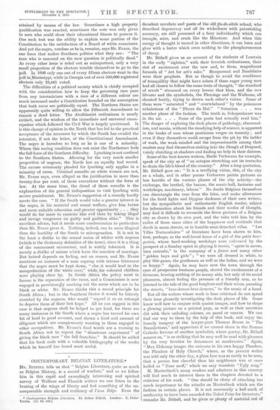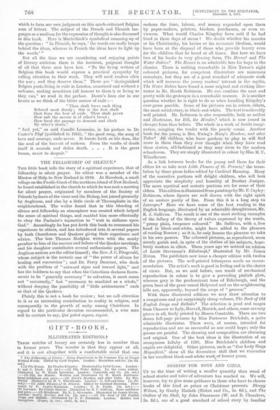CONTEMPORARY BELGIAN LITERATURE.*
MR. BITHELL tells us that " Belgian Literature, quite as much as Belgian History, is a record of warfare," and as we follow him in this rapid and exceedingly interesting and spirited survey of Walloon and Flemish writers we can listen to the beating of the wings of liberty and feel something of the uns conquerable strength and resiliency of l'ktne Beige. Even the • Contemporary Belgian Liieratara, By Jethro Bithell, London: T. Fisher 17nivin. re. ed. net.)
decadent novelists and poets of the old jingle7siMe school, who described degeneracy and all its wickedness with painstaking accuracy, are still possessed of a fiery individuality which can trample, seize, and crush like the Minotaur. And when this energy of thought is turned in other directions, it can burn and glow with a lustre which owes nothing to the phosphorescence of decay. .
Mr. Bithell gives us an account of the students of Louvain in the early " eighties," with their feverish enthusiasms, their riot of excitement over the new and, to them, magnificent formula of " Art for art's sake." Maupassaut and Baudelaire were their prophets. But as though to avoid the semblance of tranquillity that might have arisen if these eager young men had all chosen to follow the same train of thought, " the standard of revolt " streamed on every breeze that blow, and the vers libriates and the symbolists, the Flemings and the Walloons, all shouted lustily, trying to drown each other's voices. Sonic of them were " saturated " and " overwhelmed " by the poisonous exhalations of the " Flews du Mal." " Satanism . . . was another phase of the fashion. The truth is, Schopenhauer was in the air.. . . Some of the poets had actually read him." The danger of exploring the dark places of pathology, abnormal- ism, and mania, without the steadying help of science, is apparent in the books of men whose pessimism verges on insanity ; and even if they themselves could escape from the pit by the ladder of work, the weak-minded and the impressionable among their readers may find themselves sinking into the Slough of Despond, vainly clutching at shadows and finding no help in their distress.
Some of the best-known writers, Emile Verhaeren for example, speak of the city as of " an octopus stretching out its tentacles to drain the life's blood of the country." After a long quotation, Mr. Bithell goes on : " It is a terrifying vision, this, of the city as a whole, and in other poems Verhaeren paints pictures no less horrific of the various phases of the city activity—the exchange, the brothel, the bazaar, the music-hall, factories and workshops, machinery, labour." No doubt Belgians themselves can disentangle the true from the false, and make allowances for the lurid lights and Stygian darkness of their own writers, but the sympathetic and enthusiastic English reader, athirst for information about his friends and their modes of thought, may find it difficult to reconcile the fierce pictures of a Belgian city as drawn by its own poet, and the tales told him by the exiles of those same cities of the happiness and rectitude that dwelt in mean streets, or in humble semi-detached villas. " Les Villas Tentaculaires " of literature have been shown to him, first, perhaps, as the well-loved home of a girl of the petite bour- geoisie, whose hard-working weekdays were enlivened by the prospect of a Sunday spent in playing is tennis, " spree la messes bien entendu," in the company of a fiance and many other " golden boys and girls" ; " we were alI dressed in white, to play this game, the gentlemen as well as the ladies, and we were so happy." Again, he may have seen the town through the eyes of prosperous business people, shared the excitements of a kermcsse, hearing nothing of its seamy side, but only of its social pleasures, almost fooling the pressure of a friendly arm, as he listened to the tale of the good burghers and their wives, parading the streets, " bres-dessus-bratedessons," to the music of a band.
But all the writers whose work is hero criticized do not spend their time gloomily investigating the dark places of life. Some know well how to conjure with quaint images, and how to shape a glowing picture on a printed page, as well as their ancestors did with their unfading colours, on panel or canvas. We can find our way to them by the help of this book, and enjoy the homely imagery of the lawyer-poet Thomas Braun in " The Benedictions," and appreciate if wo cannot share in the Roman Catholic fervour of another symbolist, whose poetry, Mr. Bithell assures us, " is so striking that he may well be read with pleasure by the very heretics he denounces as mushrooms." Again, " Max Elskamp images the universe in his own happy Flanders, the Flanders of Holy Church," where, as the present writer was told only the other day, a glum face was so rarely to be seen, that a person less cheerful than his neighbours was at once hailed as " Zuur moff," which we may translate "Ugly mug."
M. Alacterlinek's many readers and admirers in this country will find much to interest them in the chapters devoted to a criticism of his work. " One should be chary of attaching too much importance to the attacks on Maeterlinck which are the fashion in certain places. It is not necessarily a hall-mark of mediocrity to have been awarded the Nobel Prize for literature," remarks Mr. Bithell, and he gives us plenty of material out of which to form our own judgment on this much-criticized Belgian man of letters. The subject of the French and Flemish lan- guages as a Medium for the expression of thought is also discussed in this book. Here is Aiacter1inek's symbolical summing-up of the question : " In Flemish, he says, ' the words are really lamps behind the ideas, whereas in French the ideas have to light up the words.' " But all the time we are considering and enjoying points of literary criticism there is the insistent, poignant thought of all that these men have lost. " To the living writers of Belgium this book would express a practical sympathy by calling attention to their work. They will need readers after the war ; and they deserve them." There are " distinguished Belgian poets, living in exile in London, unnoticed and without a welcome, making munitions (all honour to them !) or living as they, can," we read in the preface. Dante's lines rise in our hearts as we think of the bitter sorrow of exile :- "Thou shalt leave each thing Beloved most dearly ; this is the first shaft Shot from the bow of exile. Thou shalt prove How salt the savour is of other's broad ; How hard the passage to descend and climb By other's stairs."
" And yet," as said Camille Lemonier, in his preface to Do Coster's Thyl (published in 1912), " the good song, the song of love and courage, ends never. It bursts forth as life does, like the soul of the bravest of nations. From the vaults of death itself it ascends and defies death. . . . It is the great lesson, never to despair."





















































 Previous page
Previous page